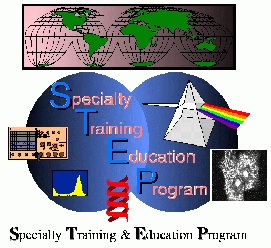


[Introduction to STEP]
[Specialty Areas]
[STEP Committee Members]
[Search for Keyword]
FISH Methodology
Image Cytometry
National Flow Cytometry Resource (NFCR) Los Alamos National Laboratory Los Alamos, New Mexico 87545Laboratory Profile
Directors: Jim Jett, Ph.D., NFCR
Babetta Marrone, Ph.D., Image Cytometry/FISH Analysis
1. Facilities: In addition to individual investigator's laboratories there is a 500 square foot user laboratory facility for cell culture, preparation, and staining along with limited desk space for visitors. Laboratories for instrumentation development are available along with associated electronics and test equipment.
2. Instrumentation:
Flow cytometry: Multiparameter 3-laser flow cytometer/sorter, phase sensitive detection cytometer, EPICS V, EPICS 752, Fourier transform flow cytometer, Partec PAS II, Becton-Dickinson FACS II, Flow Microfluorometer (DNA analysis), DNA fragment sizing flow cytometer, kinetic cytometer.
Supporting instruments: Zeiss Axiophot microscope with a cooled CCD array camera and an ICCD camera. SPEX Fluorolog-2 Spectrofluorometer, Zeiss Confocal Laser Scan Microscope, SLM solution fluorometer for fluorescence lifetime measurements.
Analytical capabilities: A large network of computers is available that includes a Micro-VAX cluster, SUN workstations, and access to the Los Alamos National Laboratory central computing facility. Macintosh and IBM PC computers are also available for flow cytometric data analysis. Additional data analysis and display software is available including programs for cell cycle distribution analysis, clustering of multivariate data, list mode data file analysis, and the IDL package.
3. Specialization Areas: Chromosome analysis and sorting (human, mouse, Chinese hamster, rat and others), cell cycle analysis (by BrdU incorporation and other techniques), applications of multiparameter flow cytometry in cell biology (immunophenotyping, DNA-RNA-protein), macromolecular assembly processes, receptor structure, kinetic measurements, single cell spectroscopy (fluorescence lifetime, wavelength), multivariate data analysis, instrumentation development for special problems.
4. Special Opportunities: The National Flow Cytometry Resource and the Maine Medical Center Research Institute present a yearly flow cytometry training course at either Los Alamos or at Bowdoin College, Maine.
5. Special Courses Offered: In-depth specialized training can be arranged for any of the specialization areas.
6. Graduate Program: Graduate research and limited course work is available in Los Alamos. A Ph.D. training program in Biomedical Sciences at the University of New Mexico is affiliated with the NFCR. It is possible to take formal course work in Albuquerque and perform thesis research in Los Alamos. In addition, thesis research is often conducted at Los Alamos by special arrangements with faculty at other degree-granting institutions.
7. Local Accommodations: Local motels and bed and breakfast establishments provide comfortable and affordable accommodations. Local transportation is limited but one motel is within walking distance to the laboratory.
8. Transportation: Los Alamos is served by Albuquerque International Airport (ABQ) and Ross Airlines, which flies into Los Alamos about every two hours on weekdays. Flying time from Albuquerque is 25 minutes and driving time is 2 hours (110 miles).
9. Cost of Internship: For collaborative projects and short duration specialized training, most laboratory-incurred costs are supported by the National Flow Cytometry Resource (NIH and DOE supported).
10. Communications:
James H. Jett, Ph.D. Director, National Flow Cytometry Resource Life Sciences Division, M888 Los Alamos National Laboratory Los Alamos, New Mexico 87545 Phone: (505) 667-2791 FAX: (505) 665-3024 E-mail: jett@lanl.gov Babetta Marrone, Ph.D. Life Sciences Division , M888 Los Alamos National Laboratory Los Alamos, New Mexico 87545 Phone: (505) 667-3279 FAX: (505) 665-3024 E-mail: blm@lanl.gov
